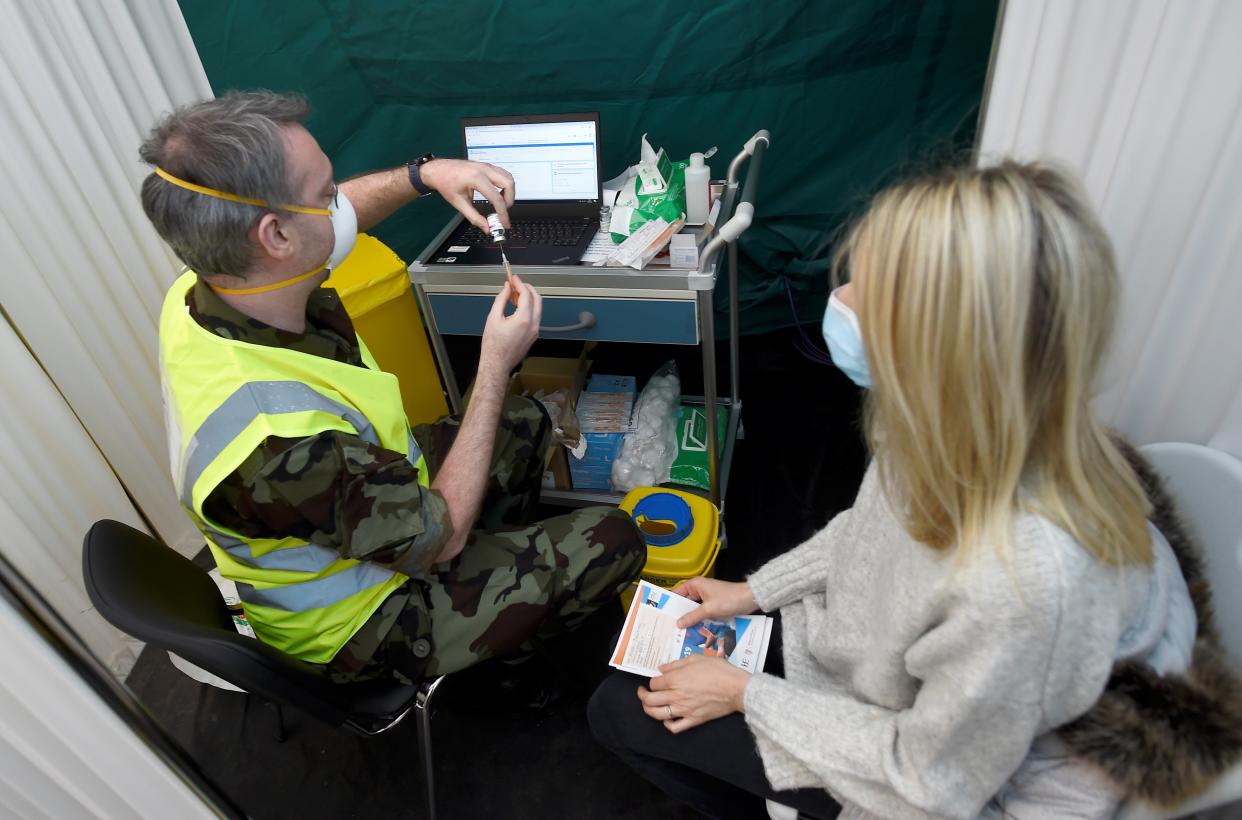AstraZeneca vaccine rollout suspended after blood clot reports, Ireland’s medical chief says

A vaccinator in Dublin prepares a dose of the AstraZeneca jab
(Reuters)The rollout of the AstraZeneca Covid vaccine has been suspended in the Republic of Ireland following a recommendation by Irish health officials after reports of blood-clotting incidents elsewhere in Europe.
Serious blood-clotting events have been recorded after inoculations in Norway, where the AstraZeneca vaccine programme has been paused. Denmark and Iceland have also suspended the rollout pending an investigation.
In an email to The Independent, a spokesperson for the Irish Department of Health said administration of the AstraZeneca jab had been “temporarily deferred” as of Sunday morning.
“The European Medicines Agency (EMA) is already investigating a number of reports of thromboembolic (blood-clotting) events following vaccination with Covid-19 vaccine AstraZeneca,” the spokesperson added. “Further information is expected from the EMA in the next few days, which will include a review of these additional events.”
Ireland’s Health Service Executive (HSE) also confirmed it would not be further administering the AstraZeneca vaccine until advised to do so. Other vaccinations are unaffected.
Follow live: Covid updates from the UK and around the world
The decision came after Ireland’s National Immunisation Advisory Committee (NIAC) said the rollout should be paused.
Ireland’s deputy chief medical officer, Dr Ronan Glynn, said: “This recommendation has been made following a report from the Norwegian Medicines Agency of four new reports of serious blood-clotting events in adults after vaccination with Covid-19 vaccine AstraZeneca.
“It has not been concluded that there is any link between Covid-19 vaccine AstraZeneca and these cases.
“However, acting on the precautionary principle, and pending receipt of further information, the National Immunisation Advisory Committee has recommended the temporary deferral of the Covid-19 vaccine AstraZeneca vaccination programme in Ireland.”

Professor Karina Butler, chair of the NIAC, called it a “precautionary move” and said Irish health authorities would “continue to monitor the situation and if we can be satisfied that these events are coincidental and not caused by this vaccine we will reassess the situation”.
She added: “This vaccine is proven to be very effective against severe Covid-19 disease, which is associated with a risk of clotting events. We have taken this step out of an abundance of caution.”
The UK’s Medicines and Healthcare products Regulatory Agency (MHRA) said it was “aware” of the action in Ireland.
“We are closely reviewing reports but, given the large number of doses administered and the frequency at which blood clots can occur naturally, the evidence available does not suggest the vaccine is the cause,” the body added.
Dr Phil Bryan, its vaccines safety lead, said people "should still go and get their Covid-19 vaccine when asked to do so".
Meanwhile, Ireland’s Health Products Regulatory Authority (HPRA) said it had received a small number of reports associated with blood clots following vaccination with the AstraZeneca vaccine.
They were not as serious as those described in Norway and the number involved was extremely low.
A spokesperson for AstraZeneca said: “An analysis of our safety data that covers reported cases from more than 17 million doses of vaccine administered has shown no evidence of an increased risk of pulmonary embolism, deep vein thrombosis or thrombocytopenia with Covid-19 vaccine AstraZeneca.
“In fact, the reported numbers of these types of events for Covid-19 vaccine AstraZeneca are not greater than the number that would have occurred naturally in the unvaccinated population.
“In clinical trials, no trends or patterns were observed with regard to pulmonary embolism, deep vein thrombosis, or events possibly related to thrombocytopenia.
“A careful review of all available safety data including these events is ongoing and AstraZeneca is committed to sharing information without delay.”
Watch: Health secretary insists the AstraZeneca jab is 'safe'
The recommendation comes after Irish authorities had been pressing the pharmaceutical firm to speed up its supplies to the Republic. More than 117,000 AstraZeneca doses have been administered so far in Ireland.
The EMA reported that one person in Austria was diagnosed with blood clots and died 10 days after vaccination, but it stressed there is “currently no indication that vaccination has caused these conditions”.
Italy has followed Austria, Estonia, Latvia, Luxembourg and Lithuania in banning jabs from one particular batch of 1 million AstraZeneca vaccines, which was sent to 17 countries, after reports of a death.
Later on Sunday, the Netherlands also suspended its AstraZeneca rollout. The Dutch government said in a statement the vaccine will not be used until at least 29 March and it was reported that health authorities would be forced to cancel more than 40,000 appointments.
Another person was admitted to hospital in Austria with pulmonary embolism (blockage in arteries in the lungs) after being vaccinated, while one death involving a blood clot was reported in Denmark.
A 50-year-old man is also thought to have died in Italy from deep vein thrombosis (DVT), while there has been an unconfirmed report of another death in Italy.
Commenting on the decision to pause the AstraZeneca rollout in Denmark and Norway, Stephen Evans, a professor at the London School of Hygiene and Tropical Medicine, said earlier this week that it was a “super-cautious approach based on some isolated reports in Europe”.
He added: “Since we know with great certainty that the vaccine prevents Covid-19 with its attendant disease, and we are almost totally uncertain that the vaccine can have caused this problem, the risk and benefit balance is still very much in favour of the vaccine in my view.”
Watch: Should we be worried about the Oxford/AstraZeneca vaccine?
Additional reporting by PA

